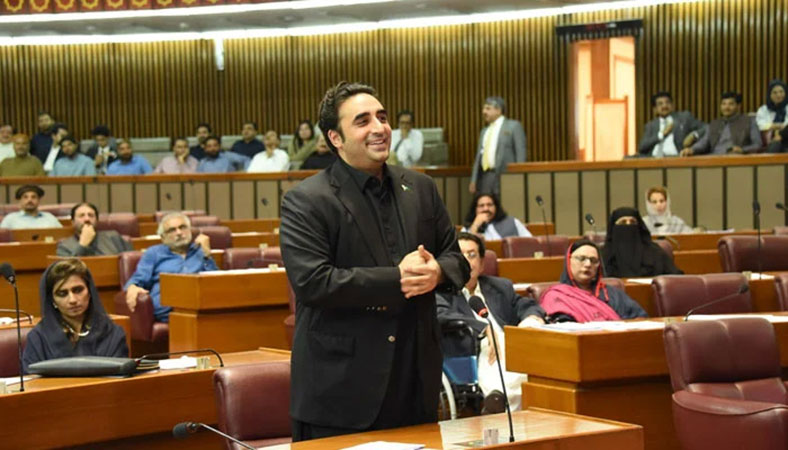 Minister for Foreign Affairs Bilawal Bhutto Zardari on Monday said it was imperative for all political parties to frame “rules of the game” and a “code of conduct” for future political endeavours. A Charter of Democracy should be formulated, wherein political parties “collectively outline the ‘rules of the game’ and the ‘code of conduct’ for their political affairs and interactions with institutions,” he said while delivering farewell speech in the National Assembly.
Minister for Foreign Affairs Bilawal Bhutto Zardari on Monday said it was imperative for all political parties to frame “rules of the game” and a “code of conduct” for future political endeavours. A Charter of Democracy should be formulated, wherein political parties “collectively outline the ‘rules of the game’ and the ‘code of conduct’ for their political affairs and interactions with institutions,” he said while delivering farewell speech in the National Assembly.
The minister urged all the entities to operate within their defined domains, admitting that the desired progress could not be fully achieved during 15-16 month tenure in the coalition government.
Bilawal called for a concerted effort towards reconciliation to mitigate animosity and enmity in the political landscape. He underscored the significance of a constructive opposition while advocating for a “brand of politics that does not fuel hatred, division, and hostility”.
With upcoming elections on the horizon, he stressed the need for political unity and reconciliation from all to steer the democratic system to continue its smooth journey. The minister appealed to the key political figures, including Nawaz Sharif and Asif Ali Zardari, to make decisions that would help create a conducive political environment, notably for Maryam Nawaz and himself. Highlighting the significant influence of the youth, who constitute 65 percent of the population, Bilawal emphasized that the future of the nation rested on their shoulders. There was need for a political approach that “inspires hope and empowers the younger generation to lead the country”.
The upcoming elections would be dedicated to fulfill the aspirations of the youth, he pledged.
Reflecting on his first term in the National Assembly (2018-2023), Bilawal recalled his inaugural speech with pride, acknowledging the legacy of Zulfikar Ali Bhutto, whose foundational role in the Assembly he had honoured. He fondly recounted his interactions and collaborations with colleagues during the period.
He underlined that the Pakistan Peoples Party Parliamentarian (PPPP) remained committed to upholding the philosophy and the teachings of Zulfikar Ali Bhutto and Benazir Bhutto. While opposing policies through constitutional means, the party refrained from abusing its political rivals and maintained a principled stance. He also noted that the constitutional process was used to vote out a prime minister.
He asserted that the PPPP’s efforts were aimed at preserving democratic institutions and ensuring the continuous journey of democracy. While in the opposition, their actions, including protests, long marches, and a no-confidence motion, were conducted within the limits of the Constitution. The verdict of history would ultimately determine the impact of their endeavours, he added.
Mentioning the roles of government and opposition in a democratic setup, Bilawal expressed concern over the actions of the Pakistan Tehreek-e-Insaf, accusing its leadership of undermining democracy, both in government and opposition. He lamented that the party had damaged the Jinnah House and attacked military installations. Despite facing challenging times, including the execution of Zulfikar Ali Bhutto and the assassination of Benazir Bhutto, he highlighted the PPPP’s unwavering commitment to the country’s welfare, encapsulated by slogans such as “Pakistan Khappe” and “democracy is the best revenge”.